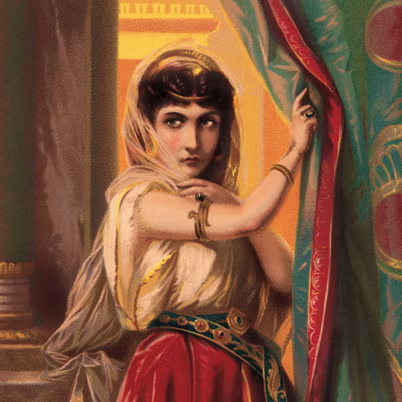
Table of Contents
Synopsis
Jezebel, a Phoenician princess of the 9th century, became a pivotal figure in the history of Israel through her marriage to Ahab, the prince who ascended to the throne. Together, they ruled as king and queen, yet Jezebel remained devoted to the worship of Baal, a nature deity. This devotion provoked the ire of her subjects and the prophet Elijah, a fervent advocate of Yahweh. In a dramatic culmination of her life, Jezebel prepared for her demise at the hands of General Jehu by adorning herself with makeup and finery, only to be cast from her balcony and subsequently devoured by dogs. Her narrative, reminiscent of Cleopatra’s, intertwines themes of intrigue, romance, and the tragic downfall of a nation.
Queen of Israel
In 922 B.C., the nation of Israel underwent a significant fracture, splitting into the northern kingdom of Israel and the southern kingdom of Judah. This division was exacerbated by internal tribal conflicts, rendering Israel vulnerable to external invasions. Despite these challenges, the nation remained largely steadfast in its worship of Yahweh, regarded as the “one true God” in biblical texts. In contrast, Phoenicia—modern-day Lebanon—boasted a rich cosmopolitan culture, characterized by a diverse population and a variety of religious practices.
Jezebel, born to King Ethbaal of Phoenicia, was a product of this diverse background. While the Bible provides little insight into her upbringing, it can be inferred that she enjoyed a privileged childhood, receiving an education befitting her royal status. As she matured, political maneuvers led to her marriage to Ahab, son of the newly crowned king of Israel. This union served to solidify an alliance between Israel and Phoenicia, thrusting Jezebel into a conservative society that sharply contrasted her former life of luxury.
As Israel’s queen, Jezebel persisted in her worship of Baal, earning significant animosity among her subjects. Tensions escalated when she brought 800 prophets of Baal to Israel and ordered the execution of several Yahweh prophets, actions that incited public outrage. The biblical narrative recounts the arrival of Elijah, who prophesied a devastating drought that subsequently afflicted Jezebel’s realm.
Final Years
One of the most infamous accounts from Jezebel’s life involves Naboth, a local landowner whose ancestral vineyard was coveted by King Ahab. When Naboth refused to relinquish his land in accordance with Jewish law, Jezebel orchestrated his wrongful execution by falsely accusing him of treason and blasphemy. Following Naboth’s death, she seized his property for the king. In response to this egregious act, Elijah confronted Ahab, predicting doom for both Ahab and his lineage, along with a grim fate for Jezebel herself.
A few years later, following Ahab’s death in battle against the Syrians, General Jehu was promised the crown contingent upon the elimination of Jezebel’s son. As Jehu approached the palace with murderous intent, Jezebel, anticipating her fate, adorned herself in makeup and elaborate attire. Interpretations of this act vary; some view it as a preparation for a dignified end, while others speculate that she aimed to seduce Jehu and secure her survival. Ultimately, she was cast from her window, trampled by horses, and met a gruesome end at the jaws of dogs.
Jezebel’s name has transcended history, often invoked to describe cunning, ruthless, and morally reprehensible women. For centuries, she has been synonymous with evil and idolatry, frequently depicted unfavorably in popular culture. However, some contemporary perspectives argue that Jezebel embodies the qualities of a suffragist—a strong, courageous woman unyielding in her beliefs, deserving of a reevaluation that acknowledges her resilience and defiance in the face of overwhelming odds.
